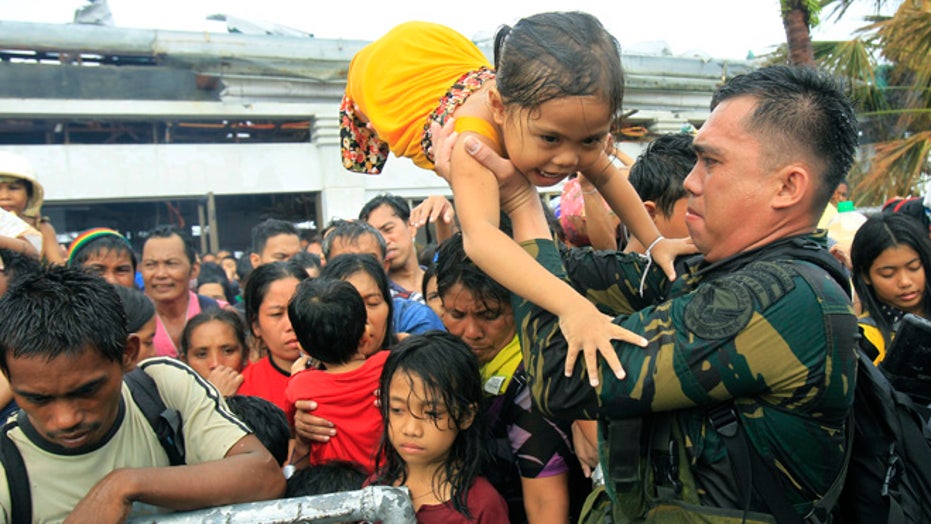The number of American troops helping the typhoon relief effort in the Philippines could triple to more than 1,000 by the end of the week, U.S. officials said Wednesday.
Senior Obama administration officials say that after a very difficult first few days, they are cautiously optimistic that logistical bottlenecks that have held up large quantities of aid material are easing.
On Thursday, the Navy's George Washington Strike Group, led by the aircraft carrier USS George Washington arrived in the Leyte Gulf to expand search-and-rescue operations, provide medical care and a platform for helicopters to move supplies to remote areas. The strike group joins several U.S. ships and aircraft that are already in the area.
2,357 people have been confirmed dead and 600,000 people were displaced by last week's powerful storm that struck the central Philippines, and many remain hungry, thirsty and sick. The Southeast Asian nation is a U.S. treaty ally, and Washington is providing $20 million in immediate aid and ships and aircraft to help distribute supplies.
President Barack Obama urged American citizens, too, to contribute, directing them to a White House website with links to groups providing aid. He noted some of the areas hit by the storm are the same places where U.S. and Philippine forces worked together to liberate the islands during World War II.
"Recovering from one of the strongest storms ever recorded will take years," Obama said in a statement. "But the strength, resilience and faith of the Filipino people are legendary."
In the hard-hit city of Tacloban, coordination at the airport has improved, and a road to the city that was cut by the storm has opened up, which should accelerate the distribution of relief supplies, said the officials, who briefed reporters about the American response to the disaster. The spoke on condition of anonymity under ground rules set by the administration.
"For the first few days, we were fully reliant on the airport for our only hub for getting anything into that town," said one official. "It was a lot like trying to squeeze an orange through a straw. We are now getting more and bigger straws."
The first airlift of hygiene kits and plastic sheeting from the U.S. Agency for International Development was distributed Wednesday to help 10,000 families, and another consignment is due to arrive in the capital Manila Thursday. The first shipment of U.S. food aid is expected to be distributed by the U.N. World Food Program in the next day or so.
The U.S. is using C-130 transport planes and Osprey helicopters to transport aid, which is now reaching out to coastal villages. The transport planes have evacuated about 800 victims of the disaster from Tacloban to Manila. Unmanned aircraft deployed from Guam have also provided overhead reconnaissance to help in damage assessment.
On Wednesday, the U.S. Pacific Fleet commander, Adm. Harry Harris, ordered the activation of the USNS Mercy hospital ship, so that it can begin preparations to go to the Philippines if ordered.
According to Reuters, the USNS Mercy, which is in San Diego, is slow-moving and it could take about three weeks for the ship to reach the Philippines if it first stops in Hawaii to pick up additional personnel and equipment, a U.S. military spokesman said.
The ship has a capacity to treat hundreds of patients at any given time, Reuters reported.
Just over 300 U.S. military personnel are currently in the Philippines.
The U.S. military is also helping transport Philippine security forces to enforce a curfew and restore order to the typhoon-hit region, where violence and armed looting has occurred because of lack of basic supplies. The U.S. officials said maintenance of security is the responsibility of the Philippine authorities, and the situation is improving.
The Associated Press contributed to this report.

